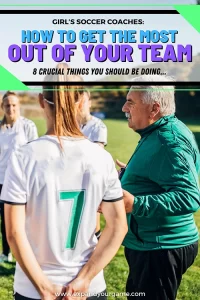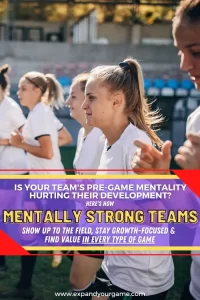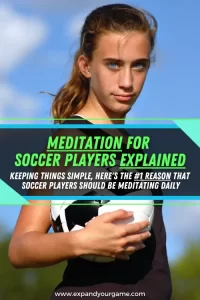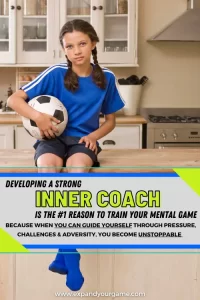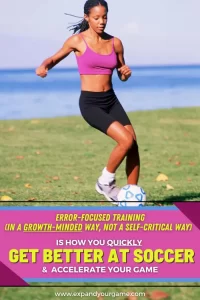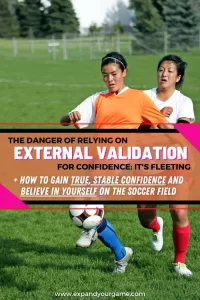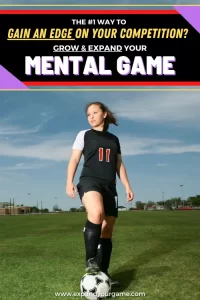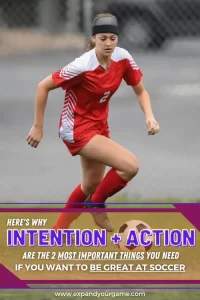We all know that ball work and fitness are good things to work on, but have you thought about what else you might be able to do RIGHT NOW if you want to become a better soccer player? Other small things that you can focus on to grow your game? Well, we’ve got 10 ideas. Some are unique, some original, some outside-the-box and A LOT of them revolved around the mental side of the game. Let’s dive in!
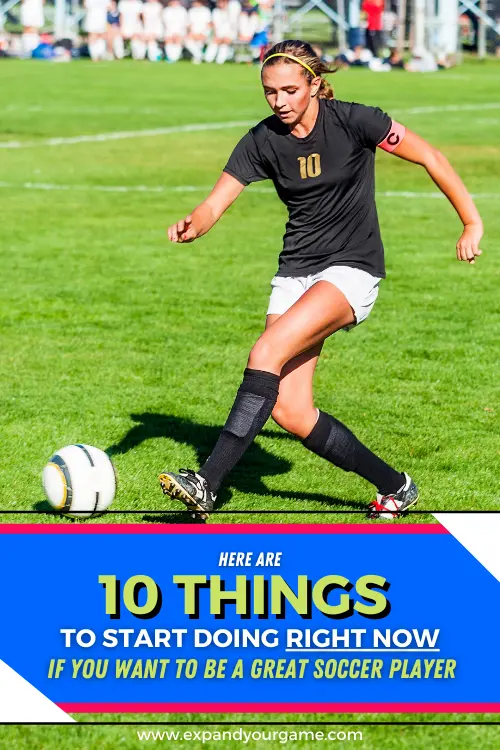
This Post Contains:
It's about the PIECES of the process
soccer Is 90% Mental
So what are you doing to train that part of your game?
Introducing the Mindset Mastery Academy
A 10-week 1:1 mental skills mentorship experience for female soccer players
(1-2) Establish an individual training routine
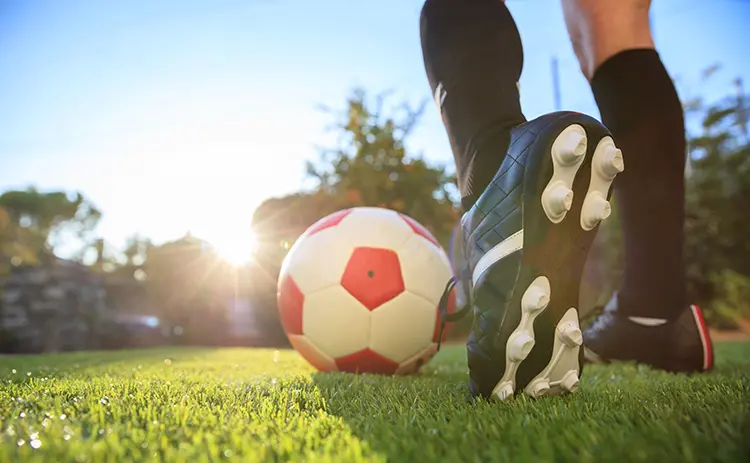
Try these two tips to get you over the bump and push you through the hard work of getting started and getting consistent:
#1 - Plan your week out
Start by writing down your schedule: team practices, games, etc. Then figure out what training you want, or need, to do this week (ball skills, finishing, endurance, sprints, strength work, etc.) and the specifics of how you want to do it. Planning everything out ahead of time makes you more likely to follow through and take action because you’ve already invested time and energy into the process.
The trick here is to get really specific. Schedule out exactly WHEN you will do the training, WHAT you will do and for how LONG. Put this in a planner or somewhere you can easily see it and access it. Or make things easy on yourself and download our free weekly soccer planner here.
#2 - Get an accountability partner
This is where an accountability partner comes in. When you have a buddy encouraging you, checking in on you, and even heading out to the field with you, it becomes much easier and more enjoyable to do the work. Or at least it becomes harder to NOT do it – because nobody wants to have to tell their friend or teammate that they didn’t do what they said they were going to do, right?
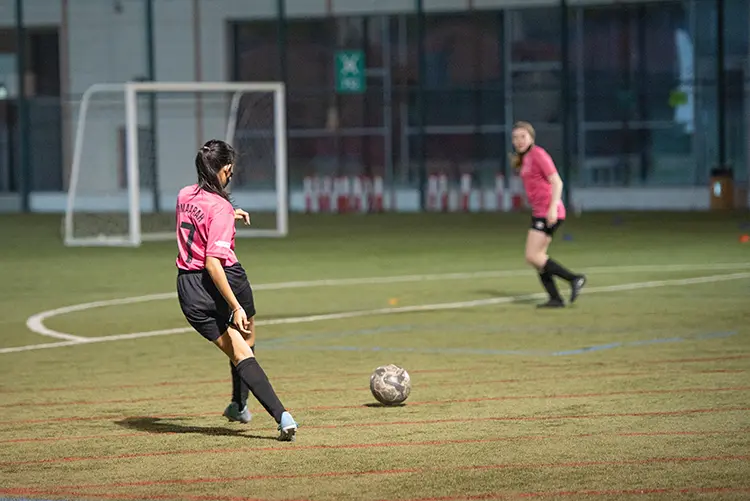
So how do you find an accountability partner? Look for a teammate, sibling or friend who has similar goals of self-improvement and ask! They don’t even need to play the same sport, although it does help if you want to train together. Once you have found your buddy, establish how you’re going to check-in, how often, and brainstorm about what kinds of things you can both do to help keep each other on track. Again, get specific.
(3-4) Reframe limiting beliefs
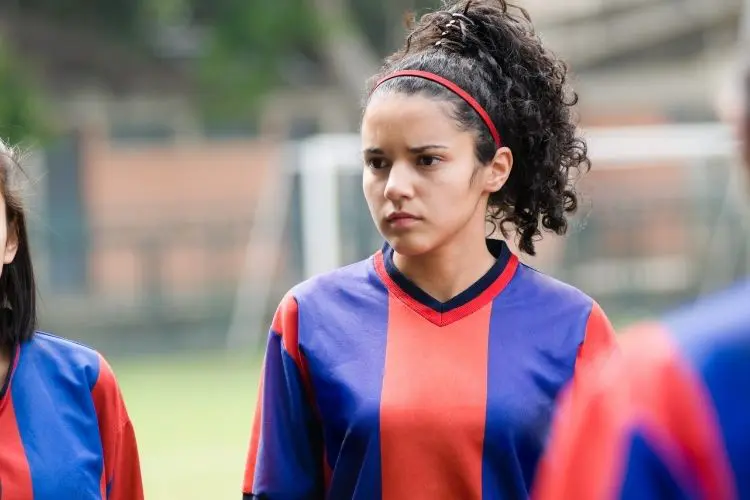
Players with self-defeating, low-confidence mentalities are less likely to succeed than less talented players with higher self-confidence and work ethic. Mindset matters, belief in yourself matters. This is because when you believe in yourself, you put in the work and you push yourself to maximize your potential. This actually GROWS YOUR TALENT and increases your skill level. Talent and skill are not fixed, and mindset and how you think about yourself plays a HUGE roll in how much effort you apply to self-improvement and growth.
#3 - Focus on progress, not perfection
We’ve all heard this before but it is worth repeating because it really is the ultimate mindset: progress over perfection. To become a better soccer player you HAVE to be able to focus on the short term, self-improvement objectives and NOT get hung up on unrealistic, outcome-based expectations (like making no mistakes or winning every game).
When your entire game plan is to play to not make mistakes, you will always fall short of your unrealistic, impossibly high standards and feel bad about yourself. Why? Because being perfect isn’t possible, it is an unachievable expectation and you are setting yourself up for heartbreak every single time.
Start working to shift your thinking by focusing on what OTHER ways you could achieve success in a match, such as performing a new skill move, connecting a certain number of forward progressing passes, etc. Focusing on the small, CONTROLLABLE pieces of the process is how you start to build your confidence and become a better soccer player while at it.
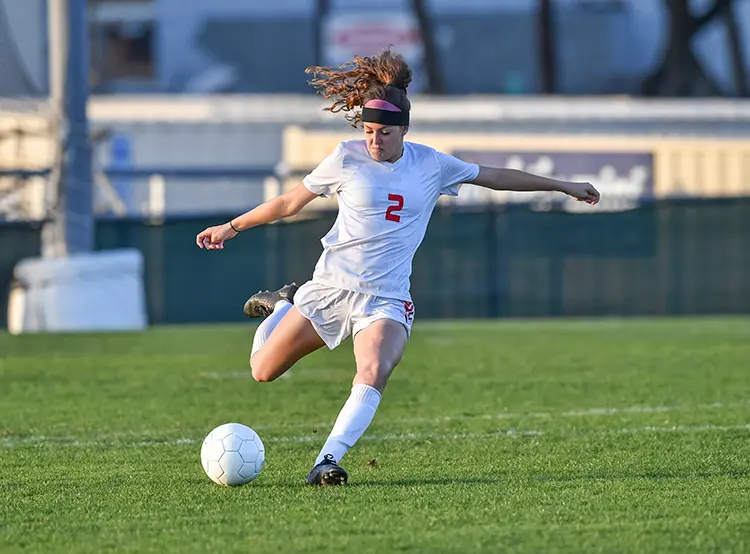
Quiz: is your perfectionism holding you back?
Is perfectionism negatively impacting your soccer game
OR is it helping you stay focused to fine-tune your skills?
#4 - Think of obstacles as opportunities for growth
To become a better soccer player, work on developing the skill of reframing difficult situations and obstacles as opportunities to expand your game and get better and stronger. One of the best mindsets to embrace as an athletes is one where you learn to appreciate and love the struggle.
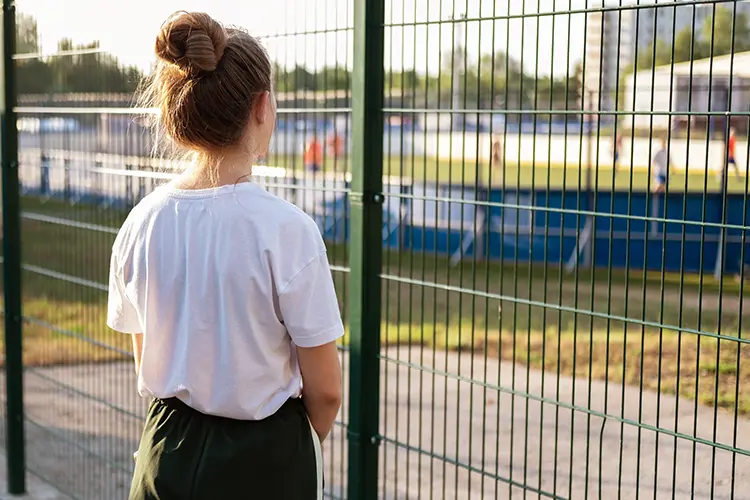
Developing mental toughness definitely isn’t the easiest thing in the world, as it can only happen in the midst of a difficult situation. The way to grow resiliency skills is to be self-aware when you in the midst of struggle or setbacks and NOTICE what is happening. Only when you are self-aware, can you then CHOOSE to see this as a learning opportunity. This eases the self-criticism and self-doubt that can poke up in hard moments, and being able to reflect and reframe will help you have more self-compassion and not mentally beat yourself up.
{Related read: Resiliency in soccer, how to bounce back STRONGER THAN EVER}
As you learn to look at these situations differently, you’ll find that you actually BECOME A BETTER SOCCER PLAYER for each and every challenge you work your way through. You add new skills, you become stronger, faster, smarter. You become aware of the fact that you are in control of how you choose to react as well.
This is how you become a better soccer player, you reframe every obstacle. You reframe your beliefs until they are no longer limiting but constructive and helpful. And then challenges become not just something that you survive, but something that can help you THRIVE.
(5-6) Set yourself up for success on game day
To optimize your performance and set yourself up for success on game day, you need to pay extra close attention to what is going on inside your head. This is the most important thing you can do for yourself in order to play to the best of your ability.
Why? Because what you choose to think about before, and during, a soccer game has huge impact on your confidence and your ability to stay calm and composed under pressure. And staying in your optimal performance zone is what controls your ability to execute and play to the best of your ability.
#5 - Create a personalized pre-game routine
Going into a game with a focused mindset will set you up to enter the match with more composure and confidence, which will ultimately help you play better that day and work towards your goal to become a better soccer player.
The best way to feel ‘mentally ready’ for a game is to get into your own personal, focused, ready-to-go zone. In order to do this, you HAVE to make time and space for yourself before the game, and you have to be very mindful of what you are doing during that time. This means CONSCIOUSLY deciding that you are only going allow in thoughts that are going to be good, useful and constructive for you to hear before hitting the field.

Experiment with what pre-game routine works best for you. Try different things out until you find something that sticks and feels good. Ideas include listening to music, snacking and hydrating, walking, stretching, meditating. Anything that gives you space to take some quiet time for yourself, but nothing too physically strenuous. This allows you the opportunity to get into a headspace where you can be at ease, get focused and stay fresh.
Over time, creating a routine pre-game and doing it consistently will signal to your body and mind that you are about to hit the field. The consistency of the routine will help with nerves because the activity you are doing doing is comforting, calming and helps you focus. Setting aside time for mindful, pre-game preparation before a game should be a priority this season if you want to become a better soccer player.
#6 - Pay attention to your self-talk
Self-talk is a big part of a pre-game routine AND a big part of your game play. Self-talk typically naturally manifests as NEGATIVE self-talk that is detrimental and impedes your focus and concentration. Once you start paying attention to your self-talk and gain self-awareness of what is going on inside your head, you can start to override the messaging and use positive self-talk to help you be a better soccer player.
There are two types of positive self-talk that you want to learn to use: motivational self-talk and instructional self-talk. Motivational self-talk is your ‘typical’ self-talk, meaning encouraging messages to keep composure and remind yourself that you can do this. You are prepared and you are capable.
Instructional self-talk is a bit different and is often used during the run of play to help you focus on executing the details of the game. It’s a message you give yourself to get you to perform an action, to trigger you to do something. Instructional self-talk is particularity useful when negative thoughts start taking over, making it hard for you to focus. By giving yourself ‘set of instructions’ and putting it on repeat, you can divert your attention from the self-defeating thoughts over to things that will actually help you right now. It’s a pretty cool trick, and it works.
Grow your confidence through preparedness.
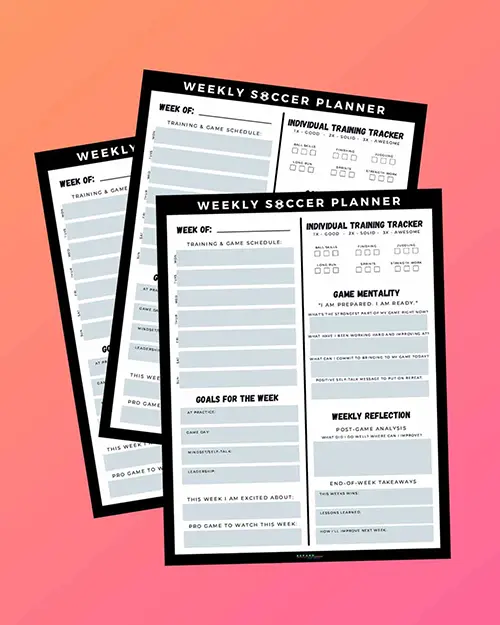
Subscribe to our email list to
Get your FREE Weekly Soccer Planner!
We respect your privacy. Unsubscribe anytime.
(7-8) Expand your Game OFF the soccer field
# 7 - Start a meditation or visualization practice

Both meditation and visualization have a large number of benefits to players that take the time to develop a consistent practice.
Meditation OFF the field will help you stay calm and composed ON the field. From being able to perform better under pressure, to helping you self-regulate your emotions and actions on the field – meditation can help you stay focused on the game and keep your mind from drifting away and getting stuck on unhelpful things. It teaches you to come BACK to the present moment when you get distracted.
Visualization is helpful for gaining confidence in specific game situations. Starting a visualization practice allows you to get in extra reps mentally without physically exhausting your body (your brain doesn’t know the difference, which is awesome). Visualization also helps puts an end to worst case scenario thinking, because when you focus on things going RIGHT over and over again, you start to feel calmer and more in control. Which ultimately helps things to right on the field.
Mediation helps you become a better soccer player. Visualization helps you become a better soccer player. Why not try one out this year?
# 8 - Read a soccer book (or two)
You can be a very talented player when it comes to technique and ball mastery, but without growth-mindset and being genuinely curious to LEARN, other players will come along and pass you by. Having an attitude where you constantly want to learn and absorb is essential to your soccer career. If you can cultivate this mindset, you will absolutely see it translating to your time on the field.
Start small by picking up a book or finding a new soccer podcast you enjoy. You can broaden your horizons and learn so much about the game by listening to and learning from others that have been there before you.
For a simple and quick, yet extremely beneficial read, I HIGHLY recommend Soccer IQ by Dan Blank. This book is packed full of extremely useful pieces of information that will directly and immediately impact your play for the better and make you wonder ‘why didn’t I think of that?’

Another great book is Twelve Yards by Ben Lyttleton. This book dives into the science and the mental performance skills involved in taking a penalty kick. It’s a fascinating read that is sure to open your eyes and have you thinking about things a bit differently. And have you ready and raring-to-go for that next PK opportunity.
If you want something a little broader and beyond the bounds of soccer, read Megan Rapinoe’s One Life – it is both about the journey of an elite soccer player but also about the journey of finding oneself and standing up for what you believe in along the way.
(9-10) Reflect, reflect, reflect, repeat
The process of reflection is hugely important if you want to become a better soccer player. Being aware of where you currently are at – your current strengths and weaknesses – is what makes a good soccer player. Self-awareness and reflection is the key to all forward progression, and the key to mental toughness.
{Related read: The 3 key pieces to building MENTAL TOUGHNESS in soccer}
In order to get anything out of reflection activities, you need to first have some level of self-awareness. How do you know if you are self-aware? If you can objectively observe yourself, and then put your observations into words, you have self-awareness.
The big picture is that there can be no change to ANY part of your soccer game without understanding, and accepting, your current state. When you fight something, get defensive over feedback or blame others for your performance, you are not self-aware and have some work to do if you want to become a better soccer player.
# 9 - Watch your game film
In this day and age of technology, most competitive youth soccer players have access to video footage of their games on a weekly basis. Players, take advantage of this! But don’t just watch your game film, STUDY IT! Break it down objectively and learn from it.
Analyze every touch you take. Was that one a good touch? A bad touch? Was it into space? Into an opponent? Analyze what you are doing every time your team gets the ball inside the opponent’s 18-yard box. Are you standing still? Making runs? Manipulating space? Pulling defenders around? Break things down, get detailed.
When playing a midfield position, how quick are you resetting and getting back behind the ball on a loss of possession? Figure out what you want to learn about your game and then actually COUNT the number of times it did, or did not, happen during the match.
#10 - Start a personal journal or vlog

Write down or talk about how you honestly and truly feel, not what you think you SHOULD feel. This helps you be able to suss out where you currently are at and where you need to go. Expressing yourself and getting into words how you think or feel about something is a very important first step in gaining the self-awareness and introspective you need to grow your game. This is where growth-mindedness starts.
Here’s a good few places to start. After every game, go through these two self-reflection questions: what did I do well? and where can I improve? Make it consistent, do it after every game for at least a month and then you can expand your reflection to include other questions after you’ve got the hang of it.
Another good thing to start doing is an end-of-week takeaways reflection. What were this week’s wins? What lessons did I learn? How will I improve next week? A good place to start is with our bundle of FOUR FREE self-reflection worksheets that you can get here.
Become a better soccer player by taking ACTION
This is intention, good intention. Most athletes have a lot of intention. How to be a great soccer player though is to not just have intention, BUT ALSO TO TAKE ACTION. Action is the key ingredient that will set you apart and help you gain an edge on your competition. Taking action is what spurs you toward greatness. Taking action is how you become a better soccer player. If you don’t take action, YOU are the one holding yourself back.
Are you ready to become a better soccer player? Let’s see what you got.
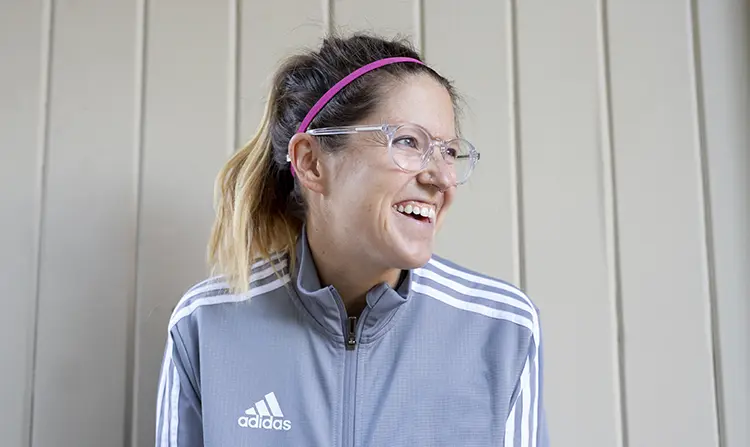
Hi everyone! I’m Jenn and I create content to help female soccer players and coaches maximize individual and team potential by developing healthy mindset skills. Join other subscribers and sign up for the newsletter for all my best tips and advice!
We respect your privacy. Unsubscribe anytime.

